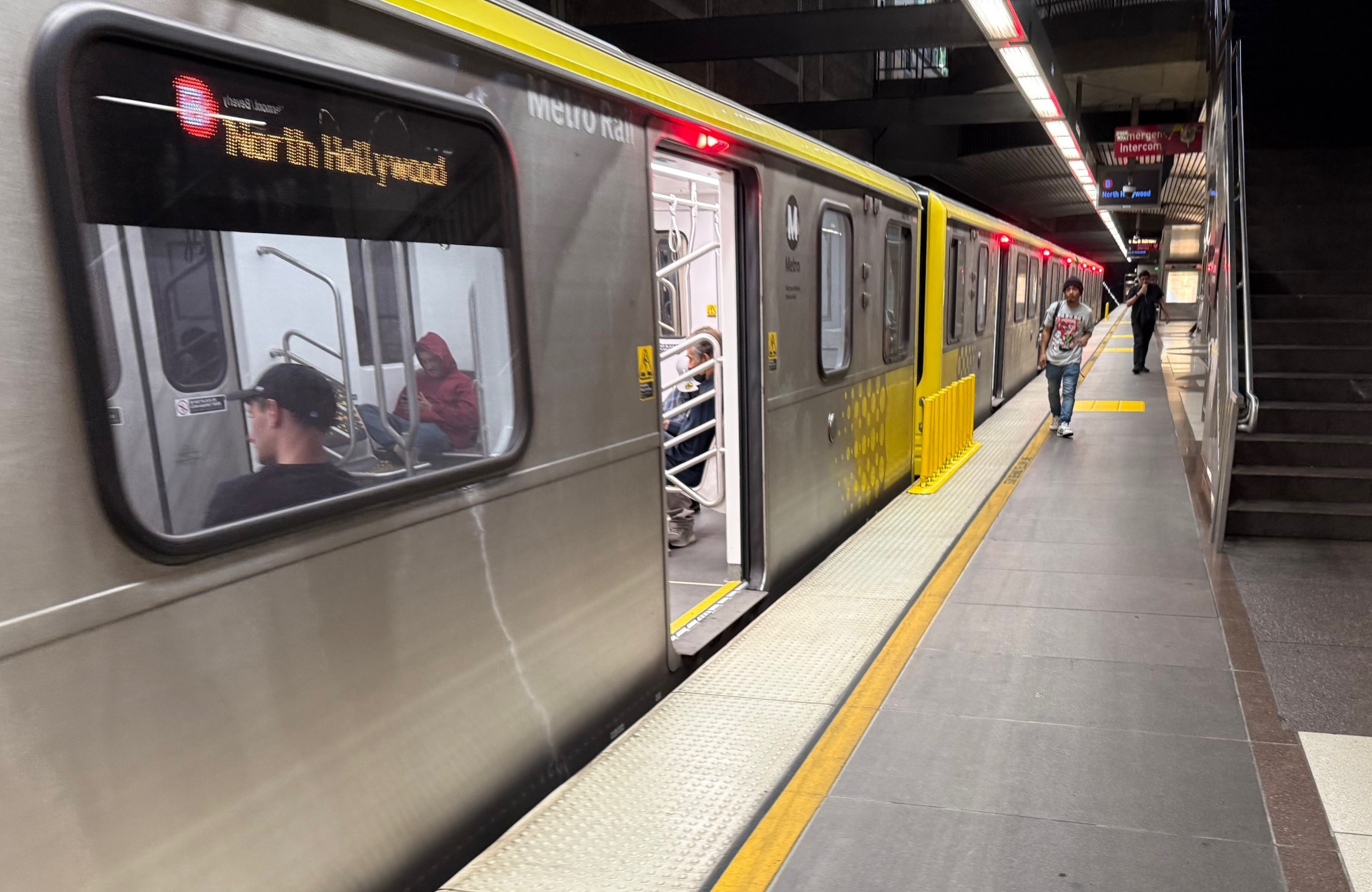Below are brief news reports from this week's Metro board committee meetings.
Report on ICE and Protests Impacting Metro
The current ICE raids and protests were not on the agenda, but were on many Metro's leaders' minds. Raids are harming Metro riders; some Metro operations have been interrupted by protests and curfews.
At this week's Planning Committee meeting, Supervisor and Metro Board Chair Janice Hahn spoke critically of ICE sweeps terrifying people, and requested Metro staff report back at next Thursday's full board meeting regarding Metro protocols regarding ICE and protecting Metro riders.
Metro Ridership Keeps Growing
In May 2025, Metro average weekday ridership exceeded a million boardings. May marked thirty consecutive months of year-on-year ridership increases.
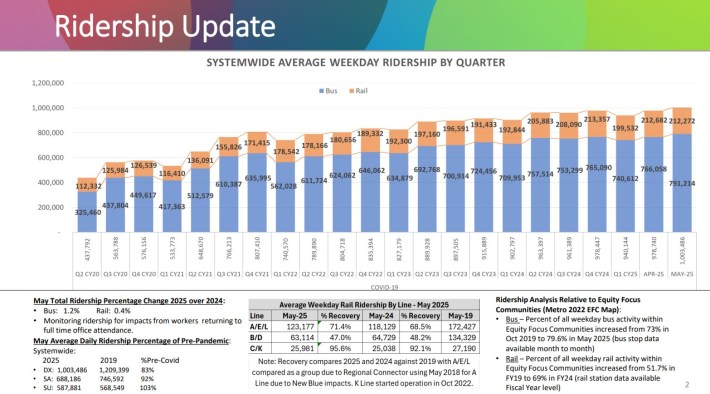
In May, Metro averaged 1,003,486 weekday daily boardings. May was just the third month of million-plus daily Metro ridership in the pandemic era. Ridership varies seasonally; it exceeded a million in September and October of 2024.
Find more ridership details in the Chief Operations Officer report. In other ridership news, today the L.A. Times reported that Metro ridership is down 10-15 percent due to fear of ICE.
Metro Service Changes Start This Sunday
Twice each year Metro does its "shake-up" transit service changes, generally modest tweaks to refine operations. Metro's Operations committee received a report on new schedules going into effect this Sunday June 22.
Dozens of bus and rail timetables will see minor adjustments; a dozen bus lines will see small reductions in service. Parts of a few bus lines are being rerouted, mainly Lines 62 and 66 through Boyle Heights.
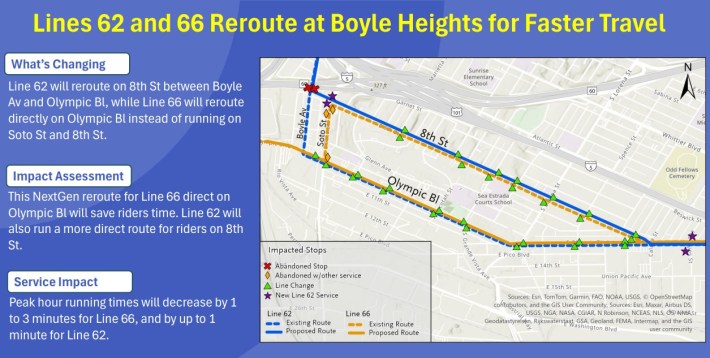
Find additional June service changes information at The Source; Line specifics are at new maps/schedules.
Metro LIFE - Low Income Fare - Program
Responding to a 2024 motion by Supervisor Holly Mitchell, Metro staff presented an analysis of the agency's LIFE (Low Income Fare is Easy) program.
The final report (summarized in the staff report and presentation) sheds a lot of light on LIFE, what's working, what isn't, and recommendations for improvement.
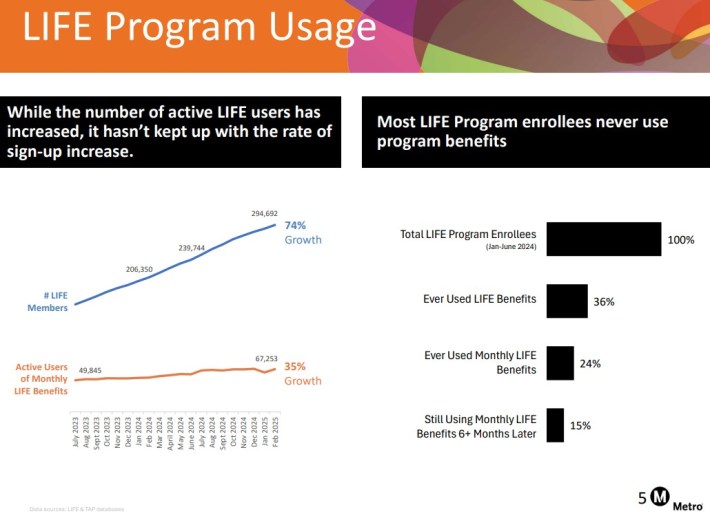
In 2024, 91 percent of Metro rides were taken by LIFE-eligible riders; only 7 percent were paid for using LIFE. Only 36 percent of LIFE enrollees ever utilize their free rides (LIFE includes the first three months free, then 20 free rides per month); six months later this percentage drops to 15 percent.
The report explores barriers to greater usage. Currently LIFE enrollees need to call each month to renew their benefits (20 free rides) each. Metro found that many enrollees were unaware that they needed to renew their benefits; many found monthly renewal cumbersome. Many lost track of their LIFE TAP card.
Metro is recommending several program enhancements, some of which are already underway.
Find LIFE program details at Metro's LIFE Program Conversion Research
Final Report.
Metro World Cup Soccer Transportation
The Operations Committee received a report (presentation) on Metro preparations for World Cup soccer. For those who don't follow soccer, there are now two major World Cup soccer tournaments (there are even more World Cups - women's soccer, other sports - but that's another story.)
The majority of this item focused on Metro preparation L.A.'s potion of the massive three-nation 16-host-city 2026 World Cup tournament. There is also, underway right now through June 25, the only-slightly-less-massive 12-host-city first-ever Club World Cup tournament.
The 2025 Club World Cup includes six matches at the Rose Bowl in Pasadena.
The 2026 World Cup includes eight matches at SoFi Stadium in Inglewood.
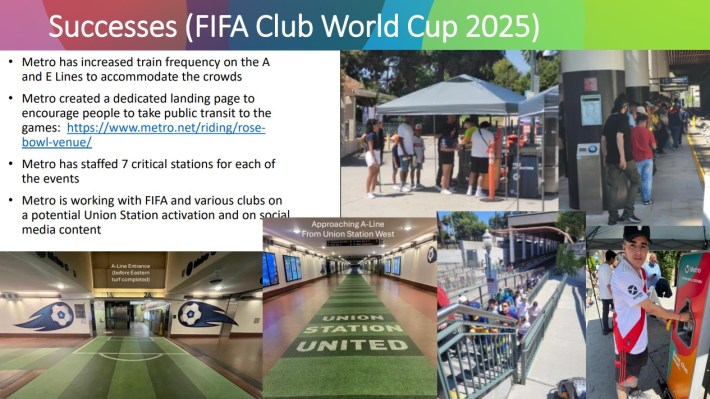
For the current Club World Cup at the Rose Bowl, transit-riding attendees take a Foothill Transit shuttle from the Metro A Line Memorial Park Station. Metro increased service on its A and E Line light rail, as well as staffing seven key stations.
For the first match last Sunday, Metro reports that shuttle buses (which serve as a sort of bargain park-and-ride) were very busy ferrying over 7,000 fans; Metro carried around 1,300 matchgoers.
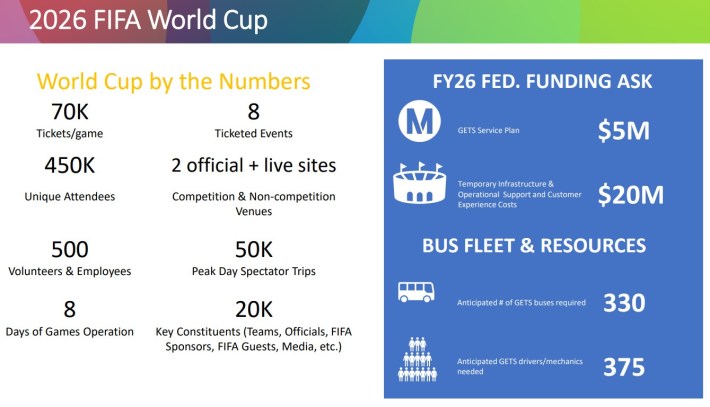
For the 2026 World Cup matches, Metro is expecting to accommodate an order of magnitude larger crowds - about 30,000 per match. Earlier SBLA coverage noted that Metro is planning $25 million worth of added transportation, mostly in the form of a sort of bus fleet/service surge.
Committee discussion focused on the difficulties of accommodating the "crush load" ridership bolus that occurs after sporting events let out. Metro CEO Stephanie Wiggins noted that downtown L.A. station escalators broke down under the weight loads from riders leaving last Saturday's No Kings demonstrations. The agency is looking to manage crowds entering stations, and to activate station areas - in order to help spread out postgame peaks.
Find more World Cup transportation details at Metro presentation, The Source, Metro World Cup webpage, and SBLA coverage. Also check out Torched for in depth L.A. mega-event coverage, including the World Cup and Olympics/Paralympics.
